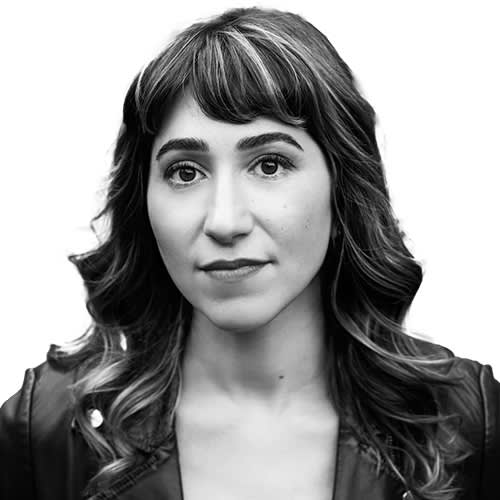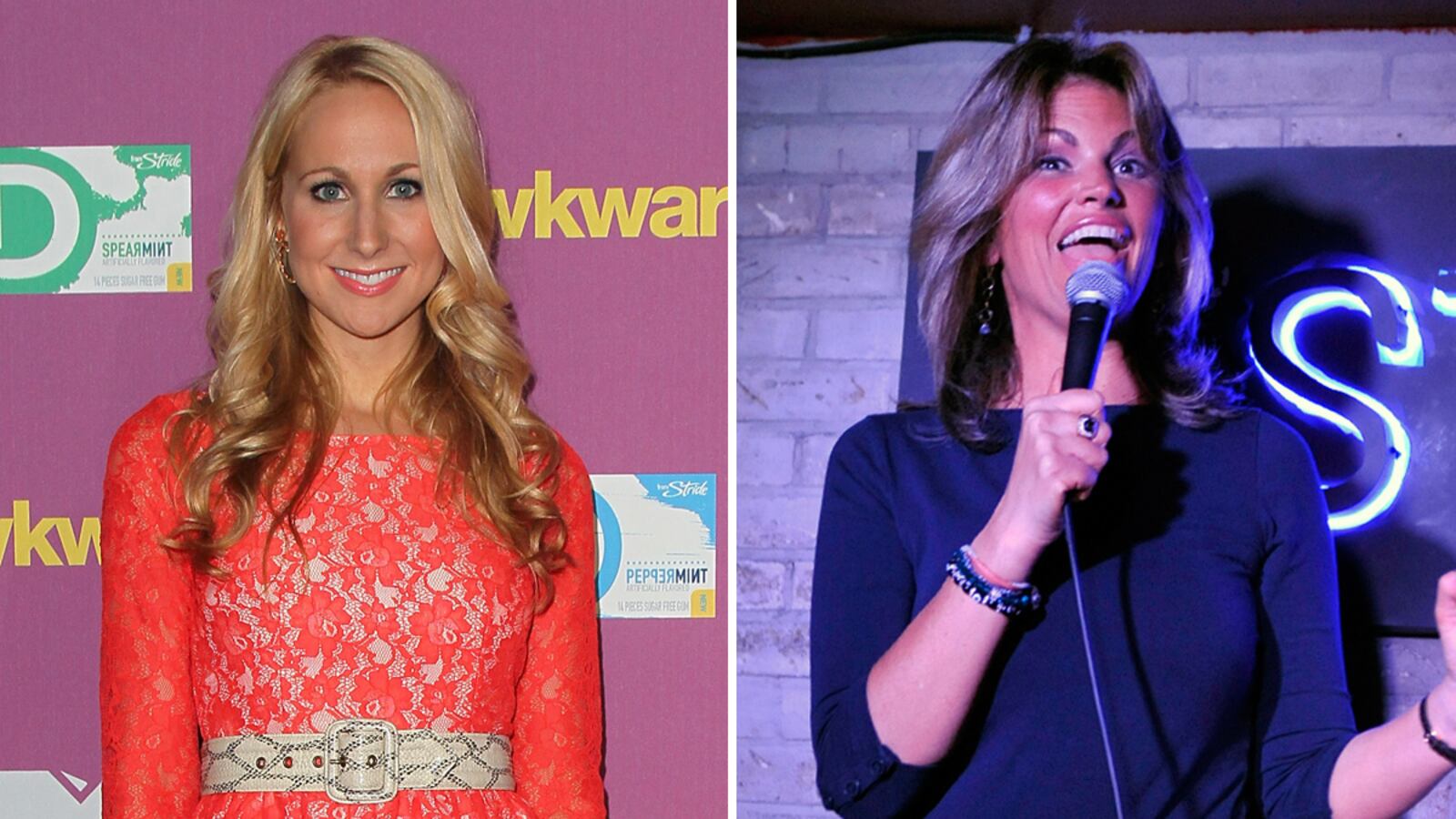Just past midnight in the dark womb of the Comedy Cellar, Lynne Koplitz, a voluptuous blonde who stands taller than some men in the audience, and who, at 45 years old, has played comedy clubs for decades, is telling us what she’d do to a rapist.
“You can’t rape me,” she says, defiant and alone on the small stage—sit in the front row and you can reach out a hand and touch her striking figure. She’s clutching the microphone, her lips nearly touching it. “I’ll kiss you right on the mouth,” she said. “I’d whisper, ‘I love you.’ What, are you leaving? Stay here and hold me, rapist, or I’m going to report this shit.”
The effect is essentially a devastating warning, even as this smart, funny, attractive woman makes fun of a fearful subject. Both Koplitz, famous for hosting the dating show Change of Heart, and relative newcomer Nikki Glaser, blond-haired and blue-eyed, used them in their Cellar sets. Amy Schumer (second cousin of Chuck, the New York senator) tells a joke that begins, “I think everyone has been a little bit raped.” Two Broke Girls, created by former Punk’d cast member Whitney Cummings, is known for doling them out regularly. It wasn’t long ago that body fluid fiend and Comedy Central host Daniel Tosh was lambasted for an extended rape joke he directed at a single live show audience member. But women comics have been tackling the subject in their sets for years. It shocks, but it’s also cathartic—many of them work to address and defuse the fear they, and most women, feel about the subject. There will always be pesky conversations about what topics, if any, are off-limits for comedic treatment, but rape jokes seem to now constitute their own genre.
Sarah Silverman once famously joked, “I was raped by a doctor, which is so bittersweet for a Jewish girl.” Recently The New York Times proclaimed that an emerging crop of bawdy women comics were Silverman clones, making their names talking sex and smut and “breaking the taste-taboo ceiling.” In fact, countless women have been doing dirty, dark, and confessional long before Silverman—Laura Kightlinger, Marsha Warfield, Gilda Radner, Paula Poundstone, Kathy Griffin. The list goes on.
A sense of history helps us understand that any woman comic worth her mic time draws laughs through originality and pushing boundaries, and has been doing so since the dawn of the male-dominated medium. That’s what Yael Kohen’s new oral history, We Killed: The Rise of Women in American Comedy, argues, weaving together interviews with some of the most prominent comedians, writers, actors, club owners, and agents who created much of American comedic entertainment in the last 60 years.

The story began with Phyllis Diller and Elaine May, who emerged amidst political, foul-mouthed, confessional, and, of course, male comics in the ’50s and early ’60s, and rather than performing vaudeville, they just talked, and showed that women deserved to have their point of view heard. Diller and, later, Lucille Ball and Joan Rivers, upended the sacrosanct housewife trope, mocking chores, motherhood, pesky husbands, themselves, and their stupidity for buying in to domesticity. They were all steered mainstream practically during their first appearances on The Tonight Show by then fame gatekeeper Johnny Carson.
Diller recalled starting out at clubs filled with rag salesmen who didn’t care for smart material. Instead they craved Borscht Belt shtick with a side dish of “titties, and boobs, and dancing girls.” That’s what she was up against. Plenty of female comics have fought their own battles since—battles for dynamic roles in TV and film that didn’t depend on “f--kability,” battles to get into writers’ rooms, and battles just for a chance to make the lineup of comics on small comedy stages nationwide. To this day it is still rare to find more than one or two women billed on any given night at famed comedy spots, the Cellar included. Television executives tend to see humor and talent in only the most beautiful women.
Suzanne Sommers reading her poetry to Johnny Carson (after his producers discovered she was a hot extra in American Graffitti), and the repeated casting of Brooke Shields exemplified this myopia. Whoopie Goldberg was told she had no “f--kability.” Ellen DeGeneres had to fight ABC to come out; she finally did so, in character on her show Ellen, which was canceled not long after. “[M]y nightmare, that if they found out I was gay I’d lose my career, came true,” she said. Roseanne Barr had an answer for outsized emphasis on beauty and demeanor. “People come up to me and say you’re not very feminine. So I say, well, suck my dick.”
Writing for film and television offered some women comics the opportunity to control the narrative, but did so by displacing them from the stage. Merrill Markoe, who won three Emmys as head writer for Late Night With David Letterman, was first a standup who dated the not-yet-famous Letterman, helping him write material for his own act, and even lending him her own jokes. “I set a precedent in our relationship as being a person who knew how to write for him,” she says. Markoe says she left the show in 1988 because their relationship was ending, but wishes she’d “for[gotten] the girlfriend bullshit” and instead focused on her powerful job. Few women have held head writer and creator gigs at late-night comedy shows since.

And while some stand-ups and sketch comedians lust after writing jobs or on-camera roles at top programs like The Daily Show and Saturday Night Live, many others who perform would never choose to disappear into sketch characters so far removed from themselves, or give their writing material away. The stand-up stage is a place where comics can be zanier and more outlandish versions of themselves. This individualization makes the stories they tell more diverse.
The proliferation and wild success of self-deprecating single-gal comedy about bad sex, bodily functions, rape, and slut-bashing shouldn’t be surprising, as these are subjects women have discussed with each other since maturing enough to discover them. The comedy works, in part, because it’s assumed that women don’t talk about these things. But they very much do, and so women comics bringing such topics to the stage endears them fiercely to their female audience.
“I enjoy when women say, ‘This is what we talk about,’” the 28-year-old Nikki Glaser told me over the phone. Glaser is the kind of performer for whom jokes about “fingering,” potty humor, and oral sex gone wrong are like mother’s milk. “It makes me feel so good when pretty cute girls come up to me and love me. It’s the acceptance I’ve always wanted from the popular girls.” Glaser, who is tall and blonde with a show premiering on MTV in January, is like your clever girlfriend who says what you can’t say and is who you aren’t brave enough to be.
This tact doesn’t guarantee that every club owner or audience member likes what he hears. “Kathy Griffin had no taste and she somehow funneled that into a great career,” said Gary Austin, the founder of the improvisation troupe and theater The Groundlings. In the early ’90s, Griffin did a set describing a night of bad sex. “It was just ugly and awful,” Austin said. Appearance and objectification affect women comics disproportionately than their male counterparts. Glaser agrees that simply being a woman, and an attractive one, can be intimidating to male audience members, and that in return, they can be scary. “I have guys approach me after I go on and say nasty things in keeping with the character I was in front of them,” she says. “They say, ‘I’ll f--k you in the ass.’ I literally just said I shit my pants. You’re really into that? I’m a freak on stage and a lady off the stage.”
While New York comedy clubs employ security, safety can be a concern for women comics traveling alone. Koplitz said she never drives to shows alone, and while sometimes the clubs she performs in have condos for her to use, she never stays on site. It’s too close to the scene of the crime.
The possibility of confrontation is ever-present because stand-up is one of the few, if not the only artistic medium that welcomes rude interruption. Glaser says attacking the audience is off-limits, though she did call a heckler a “c--t” once. “It felt amazing. She crumbled instantly. I questioned it afterward, but was reassured by the audience that she was being a c--t,” Glaser said.
The Comedy Cellar is so squat and small that you can discern the facial expressions of the person the furthest from you. “After telling her rape joke,” Koplitz continues her set and bemoans the challenges of conceiving at 45. That’s when a heckler shouts, “What are you doing later?”
Koplitz seizes the opportunity, and diagnoses the crudeness of the outburst as symptoms of “pussy-repellant serial killers.” By the time she’s finished with them, the audience emphatically agrees with her.
Women comics still have to fight to tell their jokes. An agile self-defense can be a comedian’s best friend.
Editor's note: An earlier version of this article said Amy Schumer is the daughter of New York Sen. Chuck Schumer, and that Kohen, based on an early galley of the book, wrote that there are currently no female late-night head writers. Amy is Chuck's cousin, and the final version of the book noted that women have been head writers since Merrill Markoe, though there are very few of them.






